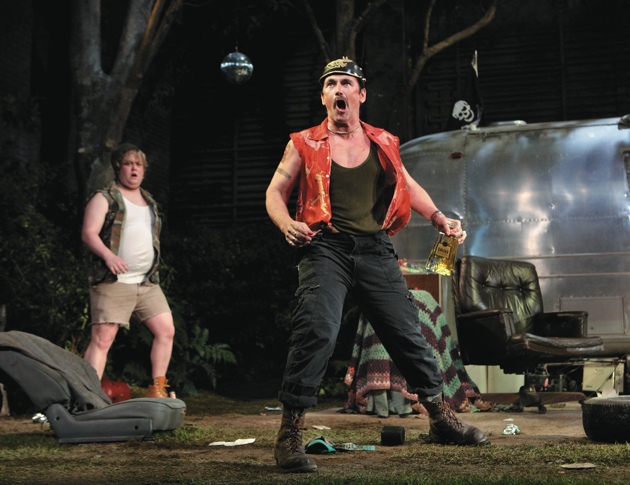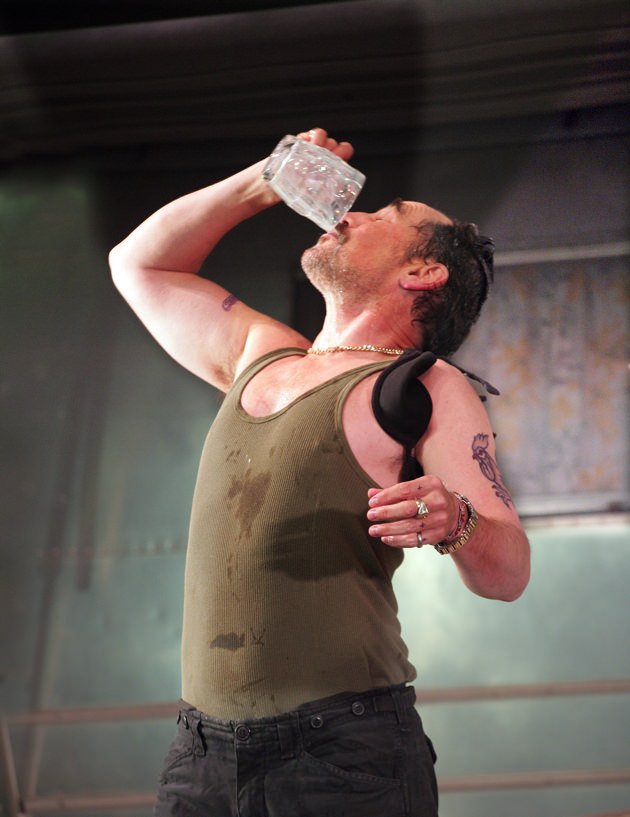The red cross on a white background, the English national flag of Saint George, used, a few decades ago, to be little more than a curiosity—something you learned about in the Boy Scouts, along with reef knots and map-reading and the Morse code. In national life it took second place to the red, white, and blue Union Jack, which is the flag of the United Kingdom as a whole; for it was natural that, if you wanted to express your patriotism, you expressed it as a loyal citizen of the United Kingdom of Great Britain and Northern Ireland, not of England alone.
Today though, if you see the flag of Saint George displayed, it can mean two things: it can stand for an emphatically English nationalism (by common implication, a protest against the European Union’s intrusions on sovereignty); and it can herald a fanatical interest in soccer, a game in which, since England plays internationally as England, Scotland as Scotland, the fans are always clear and precise about whose side they are on: unlike the rest of us, they never say England when what they mean is Britain, or vice versa.
Strictly English nationalism comes with a sense of diminishment. It is like a falling back to a defensive position, a withdrawal to the last redoubt. The Empire has long gone. Ireland has mostly gone. Scotland and Wales keep threatening to be next. England is what we will be left with, more of a consolation prize than “England’s green and pleasant land.” William Blake’s “Jerusalem,” with its vision of building the Eternal City in the squalor of the “dark Satanic mills,” is sung by a young girl in a fairy costume at the opening of Jez Butterworth’s play—named for Blake’s poem—in front of what the play text stipulates: a “faded cross of St. George.” But the girl can scarcely finish the words of the song before a great cacophony is unleashed, and we see a dilapidated trailer, around which a wild party is taking place. It is night. Moments later the music stops as abruptly as it began, and the hellish vision vanishes. It is the morning after. A couple of local council officials are surveying the litter of the trailer camp—the furniture, the junk, the old British Railways sign for Waterloo Station, the chickens cooped under the trailer, the dreadful mess.
In a note to the text, the playwright finds it odd that, when this work was premiered at the Royal Court Theatre in London, it was described as “a State of The Nation piece”—odd, Butterworth says, because “I have absolutely no idea what the State of The Nation might be.” Odder still, one might say, that he should take such a heavy vase of irony and break it over the audience’s heads if he did not want them to assume a State of the Nation motive. For the symbolism he is dealing with is very obvious.
When the English reach for an image of the quintessential England it is almost always to the countryside that we turn—to the villages or small towns rather than the cities, to the parish churches rather than the cathedrals, to the woods and fields rather than the great urban vistas. If we were to stretch out for an obvious musical example of Britishness, it would be to Elgar’s Pomp and Circumstance marches—military music for an imperial parade. If we wanted to express Englishness, on the other hand, it would be to Frederick Delius, Vaughan Williams, or other idyllic composers from the English folk revival, music that reeks of rural life as it seemed around the time of the Great War—“cowpat music” as it is known to its detractors: “Brigg Fair,” The Lark Ascending, A Shropshire Lad.
But here at the Music Box Theater is that rural life displayed in its least alluring aspect, a slum full of dropouts and drug addicts, an antisocial neck of the woods, at war with the values of an encroaching housing development, which will in turn destroy the countryside that underpins the national myth. It is a world immediately recognizable to anyone who has had a brush with it, and those who have had a brush with it come to dread doing so again. The farmer who, driving a tractor into a field ready for plowing, fails to lock the gate behind him and finds, on looking over his shoulder, a train of hippy caravans coming in to squat knows that he has months of legal hassle ahead of him before he can get the intruders evicted. In the meantime his field is going to be out of action. The weekend cottager who, turning up on a Friday evening, discovers his house to have been ram-raided and stripped bare of its furniture is aware that he is just the latest of a series of victims.
Advertisement
Nobody has much pity to spare for a man with a second home, but still there is something pitiless about the rural criminal, and where that element of pitilessness is paired with an undercurrent of violence—not to say a certain madness—it makes for a character better avoided. Jerusalem is built around an arresting depiction of such a figure, Johnny “Rooster” Byron, a drug dealer and squatter about whom the first thing we learn is that he has been thrown out of every pub in the neighborhood for various forms of antisocial behavior. We laugh at the details, and we are charmed by Johnny Byron’s repartee, not least because the character is played by Mark Rylance, who is excellent at giving a point to the humor of a simple line, while also alerting us to a certain inner turbulence that threatens danger.
But a play like this is more than a series of gags, and while we may laugh at first, we are being asked to build up a picture of a character such as we might encounter in the real world of contemporary rural squalor. Here is a passage that amused the enthusiastic first-night audience. Johnny is talking to a local council representative:
FAWCETT: We first met in Salisbury Magistrates Court three years ago when I gave evidence against you in the dispute with my colleague Pat Pickles.
JOHNNY: (Thinks) Pickles. Pickles…
FAWCETT: You trespassed on Mr. Pickles’ property, verbally assaulted him, stripped him bare, gagged him and locked him in his shed.
JOHNNY: It’s not ringing any bells.
A part of our reason for laughing was that this was not the first time we had encountered Johnny’s ability to forget such incidents when it suited him. But we were also confirmed in a suspicion that Johnny is very dangerous indeed—this is the sort of incident that, when recounted on television crime-watch programs, is quite rightly presented as being extremely violent and terrifying to the victim. It is one of the nightmares of rural life. And yet by the end of the evening the play seems to be asking us to treat Johnny as a sort of defiant hero and even something of a victim himself.
Much of this advocacy for the character comes from Rylance himself, in a gripping performance. He is an actor whose reputation was established when he was still at drama school thirty-odd years ago. I remember one of his first appearances on the public stage, at Stratford in a piece by Edward Bond. He played a shivering child, tremulous and slight, the physical opposite of his character on Broadway, and I remember he seemed to turn down the temperature in the small theater. He was extraordinary, and his promise was in due course fulfilled in a way one might never have predicted: in an inspired move, he was offered in 1995 the artistic directorship of the so-called Shakespeare’s Globe Theatre in London.
His commitment and panache seem to have coincided with a period of uncertainty at the well-established Royal Shakespeare Company, and he managed, to an extent, to steal the Shakespeare brand from the RSC. Judged by the aesthetics of a theater dominated by the spirit of Peter Brook, nothing could have been cheesier than the Globe, Sam Wanamaker’s South Bank reconstruction of a theater type whose interior is known from a single contemporary illustration. But by general assent, over the next ten years, Rylance made a success of it. He took leading male and female roles—Cleopatra, Olivia, for which, in Elizabethan terms, he was much too old—and performed every season. Recently he has been seen on Broadway in La Bête and Boeing-Boeing.
Clearly a great deal of work has gone into the creation of the character of Rooster Byron. A small detail mentioned in the text—Rooster has a “slight limp”—becomes a pronounced oddity of movement, and therefore a continual reminder of our hero’s past as a daredevil performer who has broken many bones in the course of jumping over buses and other such stunts. Reckless clowning around on stage, a grotesque ingestion of drink and drugs, contempt for authority and anything that smacks of the respectable life—all this is on the surface of the characterization. The inner life and the rage we sometimes see, but for the most part we have to intuit the turmoil.
In essence, the play offers a rigged argument between the values represented by the city and small town (corrupt, driven by profits and kickbacks) and the forest (freedom of association, the pleasures of recreational drugs, eccentricity, safety from parental abuse at home). The young girl we have seen dressed as a fairy, singing “Jerusalem,” turns out to be the fifteen-year-old Phaedra (Aimeé-Ffion Edwards) who has left home and sought refuge in Rooster’s trailer, in which she seems to have been concealed for most of the action. Her stepfather, Troy Whitworth (Barry Sloane), comes looking for her, and has an angry exchange with Rooster, in which the latter makes an allegation upon which much of the credibility of the plot depends.
Advertisement
For if it is the case that Rooster has been allowing an underage girl to sleep in his trailer (and we can’t help suspecting that she has been sharing his bed), he has made himself extremely vulnerable before the law. And since we know that his record could not be worse, it would seem on the face of it that all the angry stepfather has to do is to report him to the police for Rooster to face several years in jail. What seems to prevent this outcome is an allegation by Rooster that the stepfather himself has a lust for the girl. If this hunch is right, then perhaps (though this is not said) Troy would be afraid to involve the authorities, since the girl might make accusations against him too.
Instead of bringing in the police, Troy fetches help from his brothers, and the three men beat up Rooster and—concealed from the audience’s view, as in a Greek tragedy—brand him with a red-hot iron cross. They would have done better to kill him off outright, for from this time on the play’s thoroughly literary contrivance, its mythology of blood and soil, are fully revealed in a dreadful climactic scene between Rooster and his young son, to whom he delivers this bit of advice:
I’ve got rare blood. Rarest there is. Roman blood. All Byrons have got it. I’ve got it and you’ve got it too….This blood, it’s valuable. To doctors. Hospitals…If you’re ever short…. Remember the blood.
As the play draws to a close, the nearby village fete is being entertained by a fly-past of Spitfires, the classic fighter planes of World War II. Against this row, Rooster bangs a drum summoning up the spirits of his ancestors. What began as an often acute and very funny picture of rural dystopia, written in a lively vernacular, ends up drenched in nonsense and sentimentality.
Jerusalem is playing at The Music Box Theater in New York through July 24.




